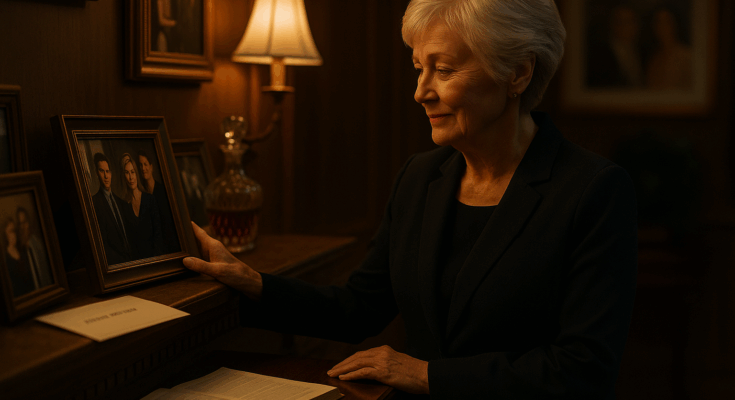Cast buzz collides with Quartermaine nostalgia as Erika Slezak’s debut hints at seismic family turns—what doors open, and which secrets refuse to close?
Port Charles loves a grand entrance, but the Quartermaine mansion reserves a different kind of welcome—rituals and portraits, silver trays and sharper tongues. Erika Slezak stepping into this world feels less like a cameo and more like a new hinge on an old door. The word around town is careful—no spoilers on final titles or bloodlines—but the energy is unmistakable: legacy is about to move. Fans can feel it humming in the walls, the way a house remembers footsteps it liked more than others. Nostalgia doesn’t mean stasis here; it means responsibility with teeth.
We’re calling this a legacy story because the Quartermaines are our longest mirror. When the family bends, Port Charles leans. Monica’s shadow is present even when unspoken, and that’s why Slezak’s arrival lands with emotional weight. The HL_verbatim—“Erika Slezak’s Arrival”—signals event status, while the HL_paraphrase—“Slezak arrives, legacy trembles”—adds the curiosity gap: trembles how? Not disaster; more like a controlled quake that cracks a locked drawer.
Fans are already building theory boards: new executor of an old wish, an ally who isn’t bound by Quartermaine etiquette, a truth-teller whose reputation precedes her. What would that do to ELQ dynamics? Who stands to benefit if a revered tradition meets a modern audit? Crosslink to Drew’s shooting (Blog1): a power vacuum invites new gravity. If someone is tugging at family threads, timing the pull with town-wide chaos would be very on-brand for Port Charles antagonists.
At the mansion, we picture golden-hour frames and subtle camera push-ins, a room that seems to inhale before a reveal. Slezak’s persona carries a kind of judicial calm—whether she’s friend, foe, or something delightfully in-between, she reads as a person who has done this before, somewhere with stakes just as high. The delight for long-time viewers is how GH uses actors with iconic histories to smuggle in meta-feelings: we trust the craft even when we distrust the character. That alone is enough to make a boardroom sweat.
Let’s talk emotional math. Quartermaine stories thrive on competing goods: tradition versus progress, protection versus autonomy. If Slezak’s character audits the ledger—financial, personal, or both—she may empower those who have felt sidelined while forcing comfortable power brokers into the light. That doesn’t have to be villainy; it could be medicine, bitter but necessary. And yet in Port Charles, even vitamins come with side effects. Expect pushback from those who think legacy equals a fixed script, not an evolving promise.
Speculation (clearly labeled) threads a second needle: Does Slezak’s arrival intersect with the Marco chatter (Blog3) or remain its own weather system? Unconfirmed buzz says she’s here for reasons larger than a single estate decision. We’ll hold the line on facts, but note the pattern GH loves: when a chess master walks on, a check has already been declared offscreen. If she’s here to arbitrate, who asked for the referee—and who fears the whistle most?
Meanwhile, the fan heart wants the beats that honor Monica without embalming her. Imagine a scene where a small detail—Monica’s annotated recipe, a stethoscope case, a photograph with a crease from being held too often—becomes the fuse for a difficult conversation. The Quartermaine language is banter until it’s not, and the not is where things change. That’s where Slezak’s character could shine: not bulldozing history, but curating it, deciding which artifacts are anchors and which are chains.
Crosslink to Jason’s rescue grid (Blog4) and Britt/Joss (Blog5): legacies aren’t just dinner table politics; they’re field decisions. Who gets resources when two crises hit at once? Who authorizes risks? If Slezak’s presence affects how the family allocates money, influence, or private security, the ripples may reach the rooftops and the docks before the ink dries on any letterhead. The Quartermaine crest on a check can be the difference between chaos and coverage.
The most intriguing curiosity gap remains: what does she know that the audience doesn’t? The cleanest partial resolution we can offer is motive-adjacent rather than plot-specific. If she represents a promise Monica once made—to the hospital, to the town, to the people who were brave when bravery cost—then her arrival is not invasion but inheritance. That kind of story doesn’t end with a gavel; it ends with a hand extended to someone who needs it, and the institution bending to be worthy.
Port Charles thrives when legacy stories touch today’s bruises. Slezak’s entry checks that box, and the mansion seems to lean forward, ready to listen. Nostalgia can heal, but only if it moves. Tonight, it moves.
—
CTA: Quartermaine fans, weigh in: which tradition deserves protection, and which one needs to break for the family to grow? Drop your vote and your wildest—but respectful—theory. ✍️✨
